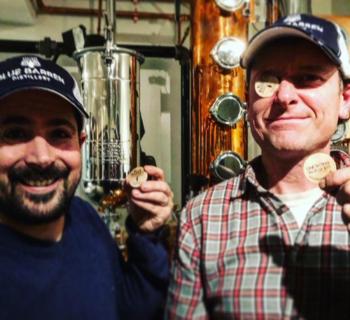|
CAMDEN— The “quiet” side of the Camden harbor, the marina and boatyard owned by Lyman Morse at Wayfarer Marine, is about to bustle with more traffic this spring with the opening of Blue Barren Distillery, a small-batch craft distillery and tasting room that will sit right next to Rhumb Line.
Co-owners Andrew Stewart of The Drouthy Bear and Jeremy Howard, a seventh generation blueberry farmer, and part of of Brodis Blueberries in Hope, are behind the small operation. Stewart, along with his wife, Shannon, owned the Hope General Store for nine years before moving to Camden and buying a house on Elm Street, converting the downstairs into The Drouthy Bear pub. The Stewarts still have deep connections to the Hope community, which is where their friendship with Howard was forged. The Drouthy Bear is the only establishment in the Midcoast that focuses on rare Irish and Scottish whiskies, so opening a distillery wasn’t a far leap. “My entire adult life in Scotland was spent working in restaurants and bars from the time I went to university,” said Stewart. “And I used to travel all around Scotland visiting the distilleries. So one day at the pub, where most good ideas start, Jeremy and I got talking about how the blueberry industry was having a real hard time on the market, with prices dropping from $1.75 per pound to 20 cents a pound. We were just thinking of ways to use blueberries in other products and thought we could make a brandy out of them.” The small talk turned into a serious interest when two years ago, the duo traveled to Boston to tour Bully Boy Distillery in Boston, the first distillery in Boston opened since Prohibition. That visit solidified their intent and from there, they began to educate themselves on the distilling process through books, the internet, multiple interviews with other distillers and even a course on distilling in Chicago. The biggest pieces to fall into place involved finding the right location, getting a loan from The First, working through the endless hurdles of federal and state licensing and choosing the best still. They eventually landed in a small dark blue building that abuts Lyman Morses marina, an industrial space, which used to be a machine shop. It took months of research to decide upon a small batch Vendome Copper & Brass Works still from a venerable company that has been making stills since 1900. The stainless steel and copper one-hundred-gallon pot still dominates the corner of the room while four giant plastic vats called totes, containing the purple mash of fermented blueberries take up the other half. On the day of my visit, Stewart was confined to the space for a period of 12-14 hours on the first stripping run. Multiple mason jars sat on top of the vats containing the clear alcohol in its various stages–the foreshots, the hearts and the tails of the stripping run. The point of this run is to strip as much alcohol from the mash as possible—the result of which is called “low wine.” What’s left over is the leftover water, sediment and yeast and bits of blueberry stem and hull, which eventually they may use in secondary products such as soaps, hand creams and fertilizer. “A blueberry brandy is going to be our first product,” said Stewart. “But, it will be a once-a-year small batch.” ‘We want to sell it, but our goal is to make a local product that the community is proud of.’ —Andrew Stewart co-owner of Blue Barren Disillery Stewart and Howard initially envisioned it would only take a month or two to harvest the blueberries, ferment them and run through the boiler on their initial stripping run back in August. But, between paperwork and the delay of getting the still, it took so much time, they had to harvest the blueberries and have Oyster River in Warren ferment the product for them. “We’ve already learned a lot, so next year, we’ll be able to take the fresh blueberries after the harvest, mash them and directly distill the brandy that way,” said Stewart. “Every year, every batch of blueberry brandy will taste different based on a number of factors, such as the weather and harvest time, which affects sugar content. Even the various different blueberry clones that have developed naturally over thousands of years have completely different flavor profiles from each other. Our goal because it will be an annual product is that each batch have its own identity.” As Stewart poured the clear alcohol into multiple glass jars, he has learned by sniffing the product to know at which phase of the stripping run it’s in. “I’m learning as we go, but a master distiller will know just by smell after if it has had air or after its been in a barrel, they have enough experience to know how the flavor profile will change,” he said. After the blueberry brandy, Stewart and Howard will move onto a Scottish-inspired gin styled after a Plymouth gin as well as rum with six new products by May or June. “Everyone thinks of Scotland as the ‘whisky country,’ but there has been an explosion of gin over the last decade with more than 100 gin distilleries in Scotland, and a huge exploration of styles and flavors,” he said. Blue Barren Distillery had hoped to debut their brandy, eau de vie, at the U.S. Toboggan National Championships February 8-10 with a vendor booth. However, due to labeling issues and delays caused by the government shutdown, the product is again delayed and they will be selling cocktails using other Maine distillers to support the growing craft distillery movement in Maine, as well generate income to launch their space. By May, they hope to renovate the machine room into a tasting room with a lab and include outdoor tables on the deck with an awning facing the ocean. “Drew [Lyman] has been incredibly supportive and kind and really excited to have something for people who come in on the boats for also for the community at large,” said Stewart. The opening will be a boon to Camden, which has never had a distillery before. “Our goal this year is to stay local; not even try to distribute,” said Stewart. “We want people to enjoy it here first. The goal is for people to think of us as part of the community and something they are proud of.” For updates stay tuned to their Facebook page.
0 Comments
ROCKLAND—It’s been a whirlwind couple of weeks for Lacy Simons, owner of hello hello books in Rockland.
In mid-January, she got a call at the bookstore from a representative of Publishers Weekly, who told her that hello hello had been chosen as one of the five nominees on their shortlist for the 2019 PW Bookstore of the Year Awards. “My first reaction was that I was just really stunned and then I honestly had to stop myself from crying a little,” she said. “ I can’t remember that last time I was so caught off guard. I’m a serious over-preparer and overthinker as a mother, a business owner, as woman in general, so to be truly surprised was a big deal. I had to pull it together.” It just so happened Simons was traveling to attend the Winter Institute, the annual conference of the American Booksellers Association Conference (ABA, the trade association for independent booksellers in the U.S.) in Albuquerque, New Mexico, on January 24 where the official announcement was made. She serves on the ABA's invitation-only Bookseller Advisory Council and frequently gives talks and moderates panels about bookshops and small business practices. Simons was present when Publishers Weekly announced hello hello books as one of the nominees. “I got to be surrounded by the people who truly understood the significance of this and it was especially extraordinary,” she said. 2019 PW Bookstore of the Year Shortlist
— Lacy Simons The PW Bookstore of the Year Award has been given every year for the past 26 years. Five bookstores were nominated this year, from a pool of more than two dozen nominees. Each winner was chosen by a carefully selected panel of five jurors, each with years of experience in the publishing industry. The decision was based on a long list of criteria including: buying, marketing, customer service; community involvement; management-employee relations, and merchandising and what makes the store unique. The motto of hello hello books, which opened in August of 2011 in the space behind Rock City Cafe in downtown Rockland, is “small but powerful.” “When they called me, they emphasized that they wanted to focus on newer and smaller stores this year, stores that are having an outsized impact on their communities,” said Simons. “For me, it means an opportunity to talk about the larger picture of starting a small business in Maine and what it takes to keep it going year round. We’re all thinking of creative ways to improve the sales margins, and one of the benefits of being so small is that we’ve been able to evolve with our customers. “On this micro level, we’re able to grow certain areas of interest on particular subjects of books, and as a result of that, cultivate this loyalty among our customers and have an impact on the reading culture of Rockland. And that’s what strengthens the ties to the community.” Last November, Simons spoke on a panel discussing how challenging it was to not only start an independent bookstore, but to delegate aspects of it to her three employees. (See related story.)For now, Simons is just getting back to work. Winners will receive a write-up in Publishers Weekly in May 2019 and will be honored at an awards ceremony in New York City. This year’s winner will be named in late March and will be featured in the pre-BookExpo edition of Publishers Weekly magazine. The awards will be presented at BookExpo in New York City in June |
The Killer ConvoThis blog is a is a killer roundup of all arts, entertainment, brewery & distillery, food trucks, happy hour happenings in the Midcoast Maine. Feel free to email me anything about Midcoast arts, entertainment & the creative economy. Archives
June 2021
Categories
All
|



 RSS Feed
RSS Feed